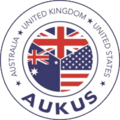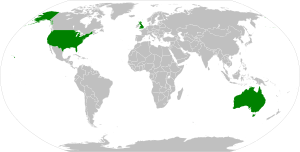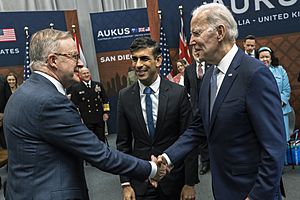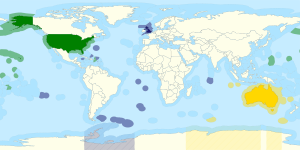AUKUS facts for kids
 |
|

Member states shown in dark green
|
|
| Formation | 15 September 2021 |
|---|---|
| Type | Military alliance |
| Purpose | Collective security |
|
Region
|
Indo-Pacific |
|
Membership
|
|
AUKUS (pronounced AW-kəs) is a special security agreement between three countries: Australia, the United Kingdom, and the United States. It was announced on September 15, 2021, and focuses on the Indo-Pacific region.
Under this agreement, the US and UK will help Australia get nuclear-powered submarines. These submarines are different because they use a nuclear reactor to power them, allowing them to travel faster and stay underwater for much longer without needing to refuel. The pact also includes working together on advanced technologies like cyber security, artificial intelligence, quantum technologies, and hypersonic missiles.
Many people see AUKUS as a way to balance the growing influence of China in the Indo-Pacific region. China has openly criticized the pact, saying it shows a "cold-war mentality".
The creation of AUKUS also meant the end of a big submarine deal between Australia and France. France was very upset, even recalling its ambassadors from Australia and the US. France called the cancellation a "stab in the back." Later, Australia's new government settled the financial part of the cancelled deal with France, and both countries are now working to improve their relationship.
Contents
Why AUKUS Was Formed
Australia's Submarine Needs
For many years, Australia had plans to replace its older diesel-electric submarines. In 2016, Australia signed a large deal with a French company called Naval Group. The plan was for Naval Group to design and build 12 new submarines for Australia. These submarines, called the Attack-class, were based on a French nuclear submarine design but would use conventional (non-nuclear) power.
However, this project faced many problems. It was delayed often and became much more expensive than planned. By 2021, the cost had risen significantly. Australia became concerned that the project was not going well.
Australia then decided it needed nuclear-powered submarines. These submarines offer advantages like greater speed and the ability to stay underwater for longer periods. This was a big change in Australia's defense strategy.
Secret Talks Between Allies
Around March 2021, Australia began talking with the UK and the US about getting nuclear-powered submarines. These discussions were kept secret from France. Leaders from Australia, the UK, and the US met during the G7 summit in June 2021 to discuss the idea further.
The three countries officially announced the AUKUS pact on September 15, 2021. Even though they didn't directly name China, many believed the pact was a response to China's growing military power in the Indo-Pacific.
What AUKUS Does
Nuclear-Powered Submarines

A key part of AUKUS is that the US and UK will share their nuclear propulsion technology with Australia. This is a very rare thing to do; the US and UK have only shared this technology with each other since 1958.
Australia plans to get at least eight nuclear-powered submarines. These submarines will carry conventional weapons, not nuclear weapons. The first step is for Australia to buy three US-made Virginia-class submarines, with an option for two more. Later, Australia and the UK will work together to develop a new submarine design.
While Australia waits for its new submarines, its sailors will train on US and UK nuclear submarines. US and UK nuclear submarines will also make regular visits to Australia.
Advanced Technology Sharing
AUKUS is not just about submarines. The three countries also plan to work closely on other advanced military technologies. These include:
- Cyber capabilities: Protecting computer systems and networks from attacks.
- Artificial intelligence (AI): Using smart computer systems for defense.
- Quantum technologies: Using the rules of quantum physics for new technologies like super-fast computing and secure communication.
- Undersea capabilities: Improving ways to operate and detect things underwater.
- Hypersonic and counter-hypersonic: Developing very fast missiles and ways to defend against them.
- Electronic warfare: Using electronic signals to disrupt enemy systems.
This cooperation aims to make the three countries' militaries work better together and share costs for new technologies.
Concerns About Nuclear Technology
Some experts have raised concerns about the AUKUS deal and nuclear non-proliferation. This treaty aims to prevent the spread of nuclear weapons.
Australia does not have nuclear weapons. However, the nuclear reactors that power the US and UK submarines use highly enriched uranium (HEU). This type of uranium can also be used to make nuclear weapons. While Australia has promised not to develop nuclear weapons, some worry that sharing this technology could set a precedent. Other countries might try to get nuclear-powered submarines, potentially increasing the risk of nuclear material falling into the wrong hands.
The US has stated that sharing this technology with Australia is a "one-off" and they do not plan to extend it to other countries.
Reactions to AUKUS
From Participating Countries
- Australia: The government believes AUKUS makes Australia safer and helps maintain peace in the Indo-Pacific. Some former leaders supported it, seeing it as a strong stand with allies. Others criticized it, saying it could damage Australia's relationships with other countries or make the region less safe.
- United Kingdom: The UK government said the deal would create jobs and help global security. Some politicians saw it as a sign of "Global Britain" after leaving the European Union.
- United States: The US government said AUKUS helps address the current strategic situation in the Indo-Pacific. They acknowledged that better communication with France could have avoided some of the anger.
From Other Countries
- China: China strongly condemned AUKUS. They said it harms regional peace, increases the arms race, and goes against efforts to prevent nuclear spread. Chinese state media warned Australia against "provocation."
- France: France was very angry about the deal's secrecy and the cancellation of their submarine contract. They recalled their ambassadors from Australia and the US. They felt betrayed by their allies.
- Japan: Japan has shown support for AUKUS, especially for Australia getting nuclear-powered submarines. There have been discussions about Japan possibly joining some parts of the AUKUS technology cooperation.
- New Zealand: New Zealand has a strict nuclear-free policy, so it stated that nuclear-powered submarines would not be allowed in its waters. However, it has shown interest in joining the non-submarine technology cooperation parts of AUKUS.
- Indonesia and Malaysia: Both countries expressed concerns that AUKUS could lead to an arms race and increase tensions in the region, especially in the South China Sea.
- North Korea: North Korea condemned the deal, calling it "extremely undesirable and dangerous" and a threat to peace.
- European Union: The EU expressed disappointment and a "lack of transparency" from the US and Australia. They felt one of their member states (France) was treated unfairly.
Images for kids
See Also
 In Spanish: AUKUS para niños
In Spanish: AUKUS para niños
- Allied technological cooperation during World War II
- Anglosphere
- ANZUS – 1951 Australia, New Zealand, the United States Security Treaty
- AUSCANNZUKUS
- ABCANZ Armies
- Five Eyes
- Five Power Defence Arrangements (FPDA) – Defence cooperation among Australia, Malaysia, New Zealand, Singapore and UK
- Free and Open Indo-Pacific (FOIP)
- Foreign policy of Xi Jinping
- List of military alliances
- Military alliance
- Quadrilateral Security Dialogue (Quad) – Strategic dialogue among Australia, India, Japan and the US
- Reciprocal Access Agreement – Bilateral defense and security pacts with Japan
- Southeast Asia Treaty Organization (SEATO)
- Tizard Mission
- UKUSA Agreement
- US–UK Mutual Defence Agreement
- United States foreign policy toward the People's Republic of China
 | Bayard Rustin |
 | Jeannette Carter |
 | Jeremiah A. Brown |




